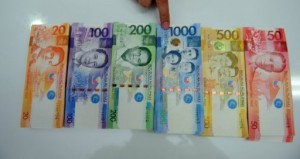MANILA, Philippines–Renewed optimism in the local equities market, as well as confidence in the peso, led to higher foreign portfolio investments in February, marking a turnaround from massive outflows last year.
Data from the Bangko Sentral ng Pilipinas (BSP) showed “hot money” flows into the country reached a two-year high amid confidence in the domestic economy’s prospects.
“This is in contrast to the net outflows recorded a year ago, due to the tapering of the quantitative easing program of the United States,” the BSP said in a statement.
In February, foreign investments in local stocks, bonds and other securities posted a net inflow of $1.19 billion or double the previous month’s $591.17 million. Foreign portfolio investments in February were the highest since the $1.27 billion in net inflows in January 2013.
The level of foreign portfolio investments, often referred to as “hot money” due to its fickle nature, is used as a barometer for investors’ perception of the state of the economy. Foreign direct investments, which are spent on capital expenditures such as new factories and equipment, is seen as a more reliable indicator.
Early last year, the country saw massive amounts of money leave the country as foreign investors divested holdings, following the US Federal Reserve’s decision to reduce its monetary stimulus for the American economy.
Share sales by two publicly-listed holding firms, and renewed interest in peso-denominated IOUs were the main reasons for higher “hot money” flows in February.
Last month, Metro Pacific Investments Corp. raised $200 million through the sale of new shares to foreign investors.
The company serves as the holding firm for the Manuel V. Pangilinan group’s interests in the Philippines outside the telecom sector. It has interests in toll roads, and controlling stakes in one of the country’s main water concessionaires, as well as Manila Electric Co., the Philippines’ leading power distributor.
Likewise, GT Capital, holding company for George Ty’s business empire, raised about P10 billion from a similar transaction. GT Capital has interests in real estate, banking, and power generation, among others.
The bulk of the investments that entered the country were from Singapore, the United Kingdom, the United States, Luxembourg and Hong Kong. Cash from the five accounted for 82.1 percent of all investments.



